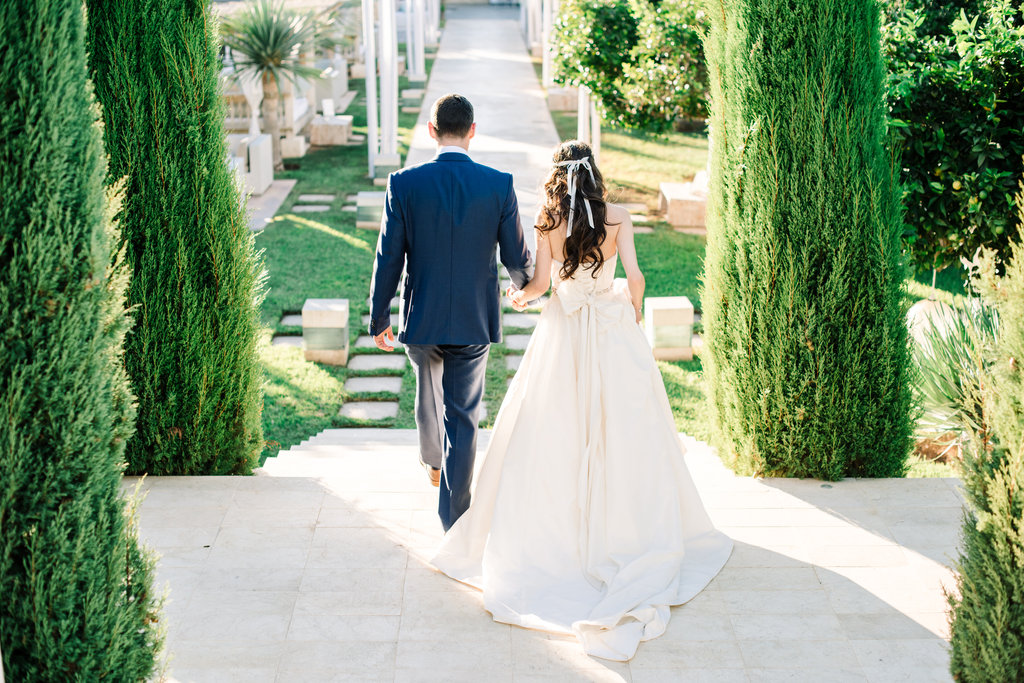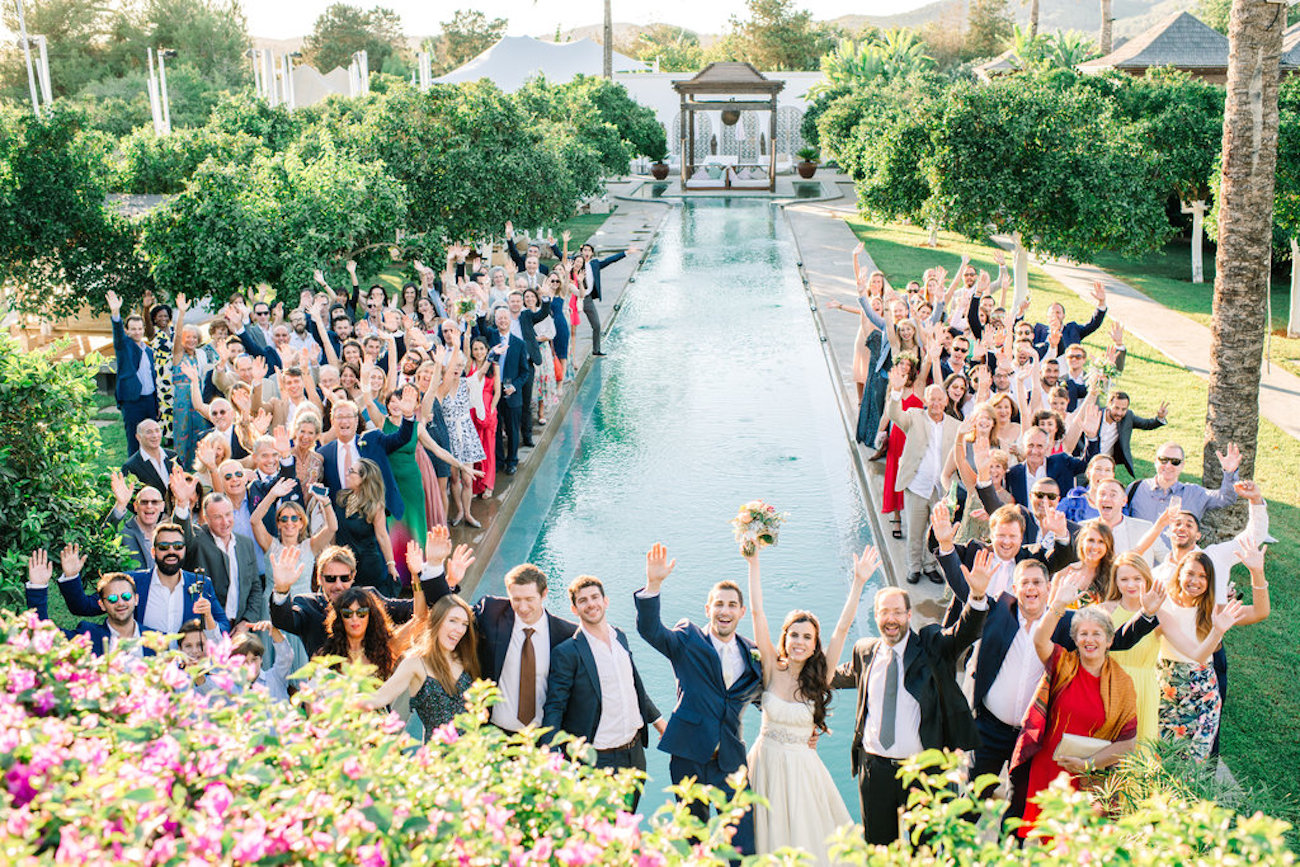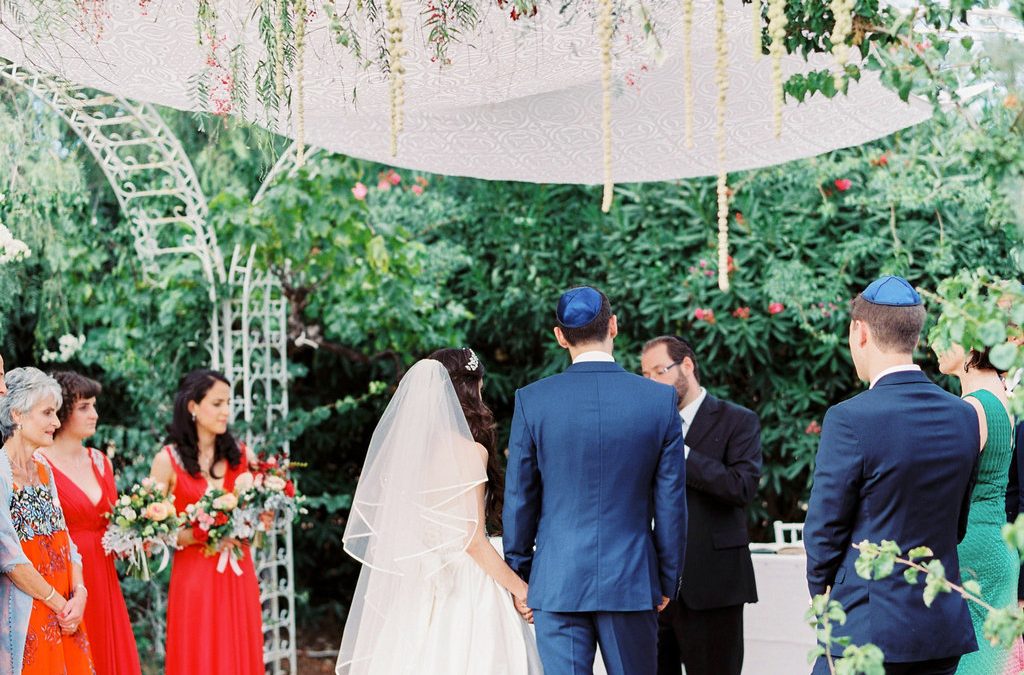Jewish weddings are one of the fundamental life events for any Jewish family, and naturally is a time for wondrous celebration. Unlike many modern-contemporary weddings in today’s society, Jewish weddings still practice and place significant importance on various ancient laws and traditions associated with their faith.
At Ma Cherie Ibiza Weddings, we recently had the pleasure of planning and creating a beautiful Jewish Wedding here on the magical white island of Ibiza, where we became well-acquainted with a culture quite different from our own.
Everything from the food, ceremony, seating, and itinerary for the day’s events were very specific to their Jewish culture, so we thought, what better than to put all of our practical experiences together and format our own personal guide to Jewish Weddings. If you’ve been invited to a Jewish wedding, or perhaps you are a professional in the wedding industry and would like to understand in greater detail the different customs and rituals of Jewish weddings, then take a look at our guide below.
We wrote and created this blog as a means to help prepare non-Jewish practicing industry professionals to successfully work with Jewish weddings, or for those who wish to gain a better understanding of the Jewish wedding tradition. We recognize there will be many traditions that are not represented within this blog and practices may vary from family to family depending on their personal faith.
Jewish Weddings Overview
Jewish weddings are a collection of very special and unique rituals that constitute the order of the day. Traditionally, within the Jewish faith, it is believed the wedding day cleanses the bride and groom of all their past mistakes, and from there forth they become merged into a new, complete and singular soul.
The journey towards this unification of souls is built on a number of unique traditions even though these traditions vary within different practices of Judaism. Every wedding is different. Some Jewish weddings only incorporate one or two traditions, while others observe several.
Traditionally Jewish Weddings are held on a Tuesday, often referring to the third day of creation, when God first declared “It is Good”. While some days may be preferred for one reason or another, certain days are prohibited and therefore Jewish weddings are not held on Shabbat or usually the day before, meaning a Friday or Saturday. Sabbath is a holy day that must be respected and upheld as a day of rest, where no other contractual agreement can be made.
Jewish Weddings: Before the Ceremony
Jewish wedding customs and rituals often start to take place in the weeks leading up to the big day.
Aufruf
Aufruf means “to call up.” Prior to the main wedding ceremony, the bride and groom are called before the Torah (the Jewish Holy Book) under the care of the Rabbi (a Jewish religious teacher) for a blessing known as aliyah. Afterward, it is common for the guests to throw candies at the couple to wish them a sweet life together.
Fasting
Just like many Jews fast for Yom Kippur (a Jewish Holy Day, known as the Day of Atonement), many couples choose to fast prior to their wedding ceremony. The fast will last until the ceremony has taken place, and the couple enjoys their first meal together as husband and wife.
Ketubah
A ketubah is a marriage contract that is part of Jewish civil law rather than a religious practice. Similar to a legal contract, the groom outlines his responsibilities to his future wife and legalises his terms and conditions, the bride’s protection and rights, and the framework should the couple choose to divorce. The ketubah is signed in the presence of two witnesses which is then later read before the guests during the ceremony.
Bedeken
During the ketubah signing, the groom approaches the bride for the bedeken or veiling. The bride and groom are usually separated and as the groom approaches the Bride, who is usually throned, he looks at her and then veils her face. This tradition represents modesty, inner beauty and references several biblical stories.

Jewish Weddings: The Ceremony
The ceremony is usually performed by a Rabbi who is familiar with all the laws and customs of the wedding.
The Chuppah (Huppah)
The Chuppah is a four-post canopy under which the Jewish marriage ceremony is performed and is traditionally symbolic of the new life and home the couple will share together. The Chuppah is usually a great way for personal expression and wedding styling, with grand floral designs and decorative creativity.
Walking Down the Aisle to The Chuppah
In Jewish ceremonies, both the bride and the groom walk down the aisle, the groom first with both his parents on either side, followed by the Bride with both of her parents. Traditionally, both sets of parents stand under the chuppah during the ceremony, alongside the bride, groom, and rabbi.
Circling
The bride traditionally circles around her groom three to seven times under the chuppah. Some people believe this is to create a magical wall of protection from evil spirits and temptation, whilst others believe the bride is symbolically creating a new family circle. More often in today’s weddings, the ancient ritual is reciprocated by the groom to represent equality.
Kiddushin
The kiddushin (betrothal) is the initial part of the Jewish wedding ceremony. It begins with greetings, a blessing over the first wine. A sip is taken by the bride and groom which is then followed by the exchange of banded wedding rings, alongside reciting ancient phrases and verses from the Torah.
Nissuin
The second part of the Jewish wedding ceremony signifies the nuptials and uniting of the couple. It begins with Sheva B’rachot (see below), given over a second cup of wine. The cup of wine from the kiddushin and the cup of wine from the nissuin represent the betrothal and the nuptials.
Sheva B’rachot
The sheva b’rachot, or seven blessings, consists of praise for God, a prayer for peace in Jerusalem, and good wishes for the couple. These are often shared among the rabbi, family members, and guests, similar to readings that may take place in Christian weddings. Sometimes, the parents wrap the couple in a tallis (a fringed garment, worn as a prayer shawl), symbolically and literally binding them together.
Breaking of the Glass
At the end of the ceremony, the breaking of the wineglass is, among other things: a symbol of the destruction of the Temple in Jerusalem; a representation of the fragility of human relationships; and a reminder that marriage changes the lives of individuals forever.
It’s also the official signal to shout, “Mazel Tov!” and start the party.
Jewish Weddings: The Reception
Mazel Tov
Mazel Tov is a term used like “congratulations,” but it literally means “good fortune,” which is a lovely wish for a new couple at the end of a Jewish wedding ceremony, and it’s time to start the real wedding celebration.
The Yihud
The yihud (seclusion) is the only part of the day where the bride and groom get to separate from the rest of the day and their guests to acknowledge the start of their new life together. It is seen as a moment for newlyweds to seize the moment and feed each other as their first intimate meal together.
Blessing the Challah
The wedding meal and reception start with a blessing, or hamotzi, over a beautiful loaf of challah, a traditional braided bread that symbolises love.
S’eudah Mitzvah
Jewish wedding meals are often Kosher, which means no pork or shellfish, and guests may choose between meat or dairy but not both. Chicken and fish are most served during the reception meal as they are both symbolic of fertility. You may also receive Sutlach—a sweet rice pudding with coconut milk, honey, and almonds—as your first course to symbolize a sweet and prosperous life ahead.
The Hora
The traditional hora, or chair dance, is the highlight of a Jewish wedding reception. The wedding couple is lifted above the crowd on chairs, while guests sing “Hava Nagila” and circle the couple in a celebratory dance.
Mitzvah Dances
The mitzvah dances are traditionally performed by the guests, often in costumes with a variety of props as a means of entertainment for the newly-weds, who are usually still seated on the chairs from the hora dance.
The Mezinke
This dance is one of the concluding Jewish wedding traditions and is usually in the case whereby a parent has married off their last child. Here, a krenzel (Yiddish for crown) of flowers is placed in the mother’s hair, while guests dance around them, kissing them as they pass.
Birkat Hamazon – Final Jewish Wedding Traditions
The last of the Jewish wedding rituals is the Birkat Hamazon or Grace after Meals. This blessing is recited by the guests, often with booklets of prayers (benchers) and the seven wedding blessings are then repeated.

Jewish Weddings in Ibiza!
Jewish weddings are a particularly special wedding event. Here at Ma Cherie Ibiza Weddings, we simply love learning about different cultures and religions as part of our journey as wedding planners.
If you’re a Jewish couple looking to find the perfect Ibiza wedding venue, then contact us today. You’ll be surprised what wonderful facilities we have on offer!
If you’re looking for a destination wedding planner here in Ibiza, then why not take a look over and choose from one of our wedding packages to suit your budget and planning requirements, or get in touch with us today!
Just say yes, and we will do the rest
Planning to get married in Ibiza? Get in touch today!
We hope by summer 2021, weddings and events will return with normality, confidence, and optimism.
Couples are considering 2022 and 2023 are steadily starting to make plans. Why not make a little start during these next few months with your wedding planning to-do list and get a head start.
You can visit our Ma Cherie Wishlist or take a look at our social media pages for Ibiza Wedding Inspiration. Or if you wish to speak with one of our Wedding Planners, then feel free to drop us a line here.


Recent Comments